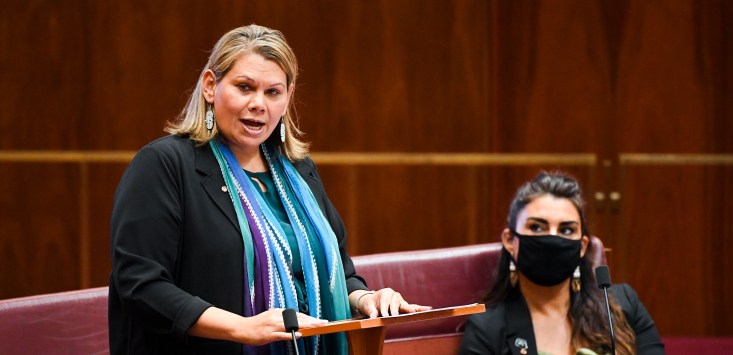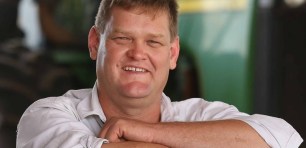
Source: AAP/Lucas Coch
The Yes campaign for an Indigenous Voice to Parliament steps up efforts this week to make clear it’s from community, not Canberra. But that’s not the only thing in motion that will give Indigenous Australians an opportunity to correct the record on an origin story.
Greens Senator and First Nations spokesperson Dorinda Cox said Indigenous intellectual property (IP) “underpins it all”. She wants the government to commit to a two-year time frame for standalone legislation that frames and protects First Nations peoples as scientists and innovators — “the first astronomers in this country, the first agriculturalists”.
“I will talk to minister Burney specifically about how we can actually put a more certain time frame around this because every day that ticks by we are seeing the lack of protection that’s being afforded to Indigenous knowledges in this country,” Cox told Crikey. “And every day it continues to discriminate and disadvantage.”
IP Australia is working on a scoping study to develop a report that will outline options for standalone legislation.
Get daily business news.
The latest stories, funding information, and expert advice. Free to sign up.
Cox said current Australian IP laws make it far too easy to slap a kangaroo on a product and market it as First Nations. She told Senate estimates last week: “One tea company, for instance, in this country, is now looking at a $7 billion economy, which Black people in this country don’t see any of.”
From the health and wellness community awarding super-food status to bush foods such as Gubinge (Kakadu plum) and using it in everything from shampoo to smoothies, to big pharma capitalising on medicinal oils and herbs for drugs, to gin distilleries sprucing up their products with native botanicals, Cox said misuse and theft of Indigenous IP was rife and “completely wrong”.
“That happened for the Moojar tree on my Country,” she said. “They’ve used that as a botanical in gin. But you need to understand the story of that tree. It is the spirit, our old people, so we would never put that in alcohol.”
How has Indigenous IP slipped through the gaps?
Australian IP laws cover only things in fixed form (a painting, a piece a paper, a logo), extend exclusively to the individual creator of said thing (painter, writer, designer), and last only so long as the life of the creator (plus a little post-mortem).
To qualify for these protections, an innovator must prove that their innovation was, well, innovative. But for Indigenous knowledge systems and structures — reading the stars, mapping land and sea, dance, ceremonies, language, song lines, stories and subject matter represented in paintings, rock art, bush medicine, land management practices — Aboriginal artist and IP Australia consultant, Saltwater woman Bibi Barba, said these originality metrics have no application.
“The Western world doesn’t understand the customary world. They don’t understand the formalities of that,” Barba told Crikey. “It’s just our innate ability to know this stuff. We know it because we’ve been doing it for thousands of years.”
In 2013, two of Barba’s artworks were pulled from the internet and plastered on the soft furnishings (floor to ceiling) of a Polish hotel — 44 rooms in total. She’d painted the desert flower, a gift of knowledge from her grandmother that represented healing and women’s business. The Polish designer argued that Aboriginal art was generic in its form and thousands of years old, therefore belonging to no one.
The time limits that apply to Australian (and international) IP laws do not accommodate for inter-generational knowledge or for anything in the realm of “secret and sacred”, she said, adding that the necessity to put something in paper form further robs Indigenous people of the rights to culture.
“When I tell you a story, whoever writes it down in Australia has the copyright,” she said. “The second source is protected but the person who gave it is not. We need laws that recognise the knowledge holder is the nucleus to that information.”
What’s the international consensus?
The UN Declaration on the Rights of Indigenous People states that Indigenous people around the world should have the right to protect, preserve, maintain and control their traditional cultural knowledge, cultural expression, and the way in which their genetic resources are used.
Trish Adjei is a Wuthathi, Mabuiag and Ghanaian woman and head of First Nations arts at the Australia Council for the Arts. She is in Geneva as an Australian representative to chair a series of workshops for the UN’s World Intellectual Property Organisation (WIPO) and participate in an intergovernmental committee on the use of genetic resources.
After 20-plus years of negotiations, Adjei said the international dial was finally shifting, as was Australia’s home-grown laws. She is confident that Australia might even beat the international instruments that will go to an official vote (to become either convention or declaration) in 2024.
“The biggest hurdle is that misunderstanding of how to engage with Indigenous people and how to follow Indigenous law,” Adjei said.
In short, that means protecting the source of knowledge, seeking permission to use knowledge, and ensuring all benefits go back to the knowledge holder. That can mean community, not simply individuals.
Cox said there was a collective appetite for a change in narrative from Indigenous people being knowledge-deficit to knowledge-rich. It’s why the Greens decided to back it in a Voice to Parliament.
“What people don’t understand and don’t know is that the entrepreneurial blood that pumps through our veins is very much based on innovation and the things that we’ve been doing for generations in our families and in our communities,” she said.
Barba agreed: “That narrative that we’re poor and we drink alcohol and commit crime — we’ve been tainted by that brush. But this IP legislation says we’re very intelligent people. It says we’re innovators and that we’ve been innovators for thousands of years.”
“It will help Australia accept that Australia does have a Black history, a beautiful Black history, strong in history and culture.”
Correction: A previous version of this story incorrectly stated that Trish Adjei was in Geneva as an Australian government-funded representative. The Australian government is funding representatives to attend Geneva, but Adjei is not one of them.
This article was first published on Crikey.
Handpicked for you

For farmers to go global, we need to think local




COMMENTS